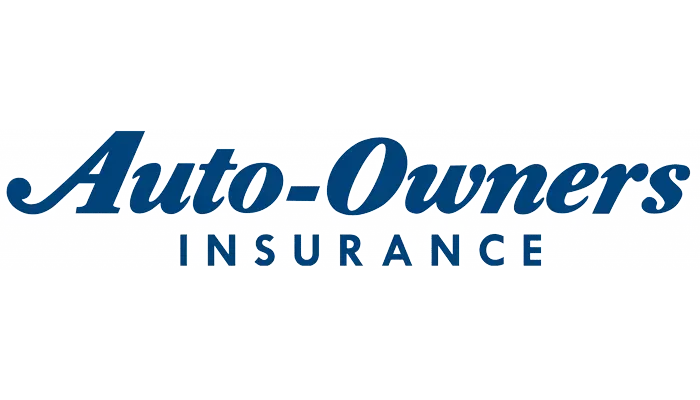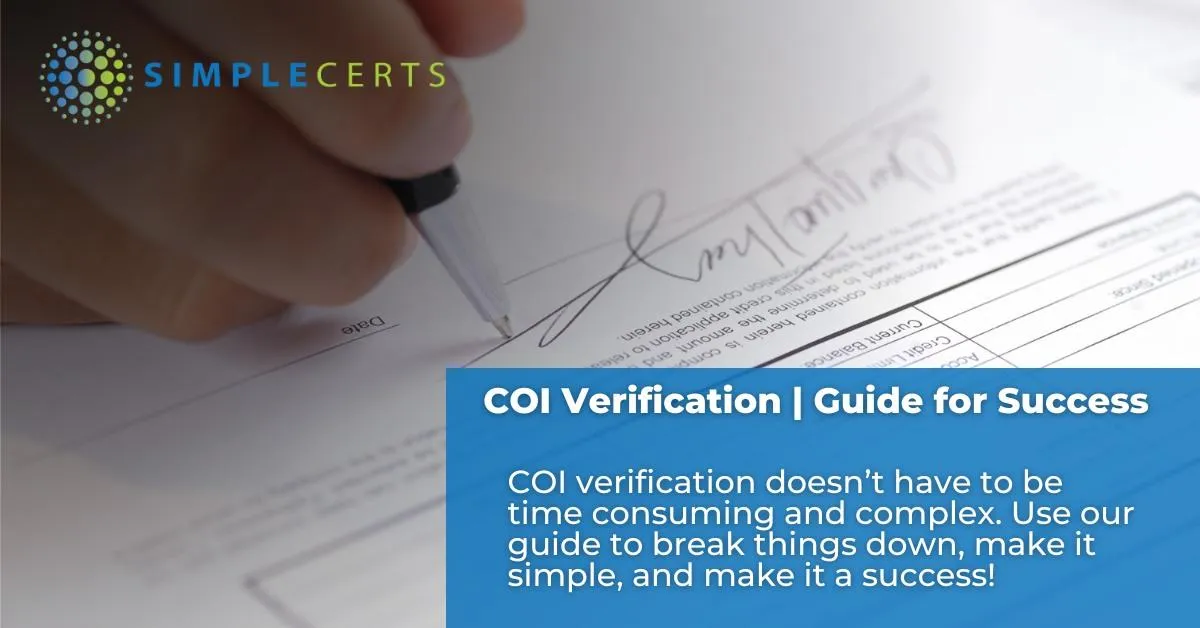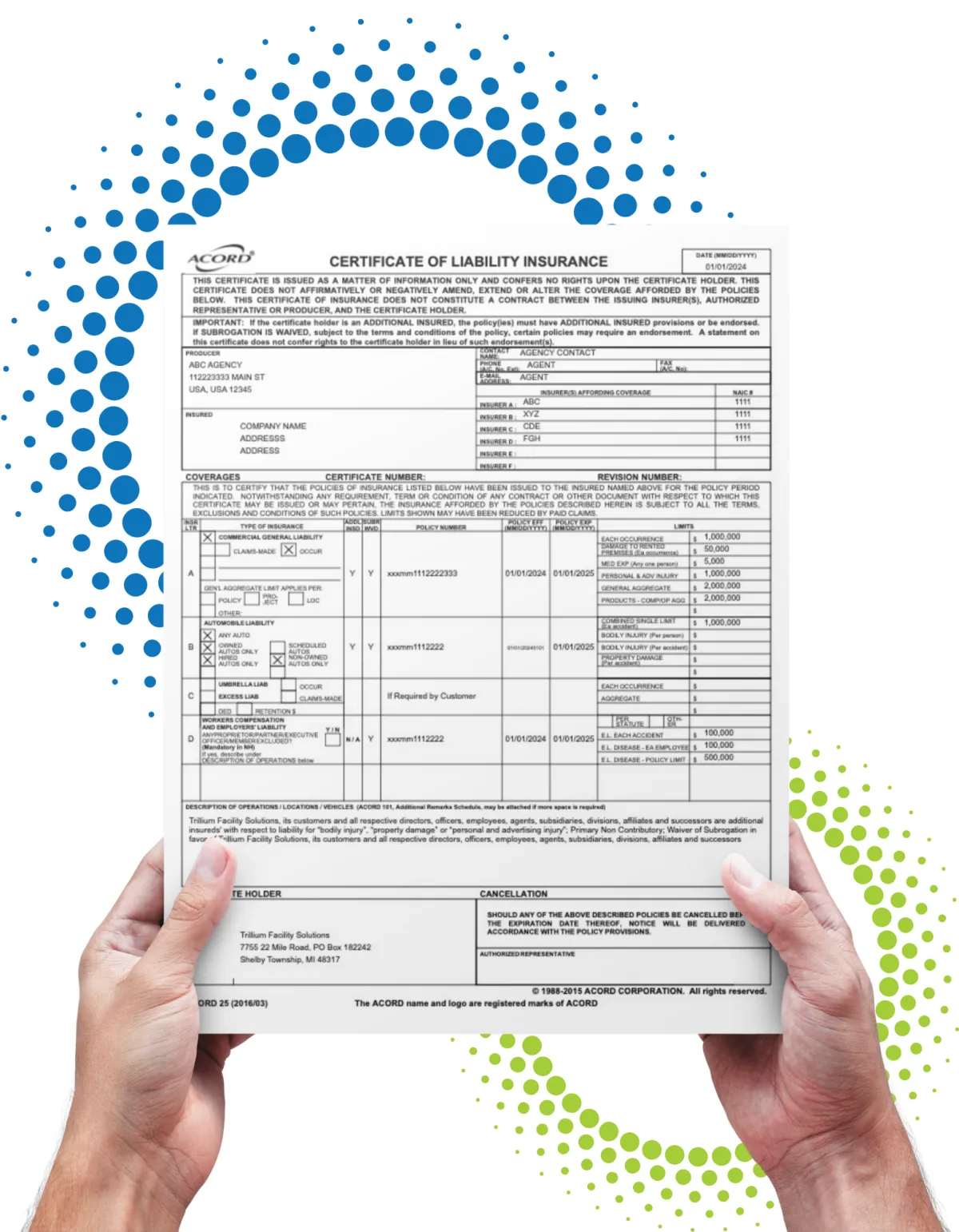Trusted by leading Brands for effective Coi management solutions






Customer Testimonial
Hey, I'm Bridgette!
Prior to SimpleCerts, COI management was manual and extremely time-consuming. After we started using SimpleCerts to organize thousands of local contractor insurance certificates in our platform, our compliance team saved hundreds of hours in a year, we reduced our risk, and created a simpler experience for our local contractors. I would highly recommend SimpleCerts for companies that want to improve the COI management process, reduce risk, and save money.
-Bridgette Lemke, Vice President | Operations & Compliance
We saved time
We saved money
We reduced risk
What our COI Tracker Includes
Complete certificate of insurance management that combines cutting-edge AI technology with expert human verification. SimpleCerts delivers affordable, fully managed COI tracking that eliminates compliance headaches for property managers, contractors, and risk professionals.

Fully managed COI Software Solution
Automated certificate collection, compliance tracking, and renewal management. Upload your requirements once and let our platform handle vendor onboarding, document verification, and ongoing monitoring. Real-time dashboards keep you informed without the manual work.

Most Affordable COI Solution
Enterprise-grade certificate of insurance software at small business prices. No hidden fees, setup costs, or per-user charges. Get unlimited policyholder certificates, automated compliance alerts, and dedicated support starting at industry-leading rates.

Human COI Verification Included
When compliance issues arise or certificates need follow-up, our certified risk management professionals step in to handle vendor communication and resolution. You get AI-powered efficiency with human expertise managing the complex situations that require personal attention.
Industries Rely on SimpleCerts COI Tracking
From construction and property management to healthcare and manufacturing, businesses across every industry trust SimpleCerts for seamless certificate of insurance management. Discover how our automated COI tracking solutions protect companies like yours from compliance risks while streamlining vendor management processes.
Recent Blogs & Articles

COI Verification: A Complete Step-By-Step Guide for 2025
COI Verification: A Complete Step-By-Step Guide for 2025
Imagine this scenario: You hired a contractor to repair your office building. They provided documents showing adequate insurance coverage. But when an accident occurs, you discover their insurance was altered, expired, or insufficient for the actual damages.
Now your business faces significant liability for costs that should have been covered. A proper Certificate of Insurance (COI) verification process could have prevented this expensive situation entirely.
In this comprehensive guide, we'll show you exactly how COI verification works and provide actionable tips for streamlining this critical risk management process.
Understanding Certificates of Insurance
A Certificate of Insurance is a one-page document that provides proof of valid insurance coverage. Businesses use COIs to confirm that vendors, contractors, and other third parties meet specific insurance requirements before beginning work or establishing business relationships.
Common COI Forms
COIs typically use two standard forms, each serving different purposes:
ACORD 25: Shows evidence of general liability insurance and may include other liability coverages when specified. This is the most common form used for contractor verification.
ACORD 28: Focuses specifically on commercial property insurance, often used for real estate transactions or when listing loss payees.
Key Information Found on COIs
Every properly completed COI should contain essential information including:
Policyholder Information: Confirms the insured party's identity and relationship to your business
Coverage Types: Lists specific insurance types such as general liability, professional liability, or workers' compensation
Policy Limits: Indicates maximum amounts the insurer will pay for claims
Effective and Expiration Dates: Ensures coverage is active and matches your business relationship timeline
Certificate Holder: Names the person or entity requesting the insurance certificate
Additional Insured Status: Identifies entities added to the policy for extended protection
Understanding these elements is crucial for property managers, risk managers, and facility managers who regularly handle vendor compliance.
Common Challenges in COI Verification
Manual COI verification presents several significant challenges that can impact your business operations and risk exposure.
Time-Consuming Manual Processes
Manually verifying COIs requires considerable time investment. For businesses managing multiple vendors or subcontractors, the workload can become overwhelming. Tracking expiration dates, verifying coverage details, and maintaining compliance records adds administrative burden without efficient systems in place.
Modern AI-powered solutions like SimpleCerts can verify certificate information accurately in a fraction of the time required for manual processes, allowing your team to focus on strategic initiatives.
Non-Standard Certificate Formats
Not all vendors submit COIs using standard ACORD 25 formats. Many certificates are incomplete, poorly formatted, or use confusing terminology that complicates verification. Non-standard forms often miss critical details like:
Policy limits or deductibles
Proper expiration dates
Required endorsements
Certificate holder information
These inconsistencies increase verification complexity and the likelihood of missing coverage gaps that could expose your business to liability.
Maintaining Continuous Coverage Monitoring
Insurance policies constantly change, expire, and renew. Without proper monitoring systems, expired policies can leave you unprotected when vendors fail to submit updated certificates. Additionally, vendors might change coverage levels or reduce limits without notification, creating dangerous coverage gaps.
The Complete COI Verification Process
Proper COI verification involves several systematic steps to ensure documents are valid and meet your insurance requirements. Here's the detailed process:
Step 1: Request the Certificate of Insurance
Communicate Requirements Clearly: Contact vendors, subcontractors, or third parties with specific COI requirements. Use email or official letters to create traceable records of your requests.
Specify Required Elements: Be explicit about what the COI must include:
Specific coverage types (general liability, workers' comp, etc.)
Minimum policy limits
Required endorsements
Effective date requirements
Additional insured status
Set Clear Deadlines: Provide reasonable but firm deadlines to avoid project delays or compliance gaps.
Step 2: Review Certificate Format and Completeness
Verify Standard Formatting: Check for the ACORD logo, proper field labeling, and consistent formatting. If the certificate isn't standard format, inspect thoroughly or request proper ACORD 25 submission.
Identify Red Flags: Watch for warning signs including:
Missing coverage types or inadequate policy limits
Mismatched effective dates
Handwritten alterations over printed text
Inconsistent fonts or formatting
Missing required endorsements
Step 3: Verify Insurance Carrier Information
Check Carrier Reputation: Ensure the insurance company listed is reputable and financially stable. Use platforms like AM Best to verify credit ratings and financial strength.
Research Carrier History: Look for complaints, legal issues, or regulatory actions against the insurer that might affect claim payment ability.
Direct Verification: Contact the insurance company directly to confirm policy details and active status.
Step 4: Assess Document Authenticity
Examine for Tampering: Any discrepancy can signal fraud or insufficient coverage. Look for:
Digital alterations after form creation
Information that appears added later
Inconsistencies in policy numbers or dates
Missing official signatures or seals
Request Verification: If you suspect tampering or alterations, request a new certificate directly from the insurance carrier or verify details through official channels.
Step 5: Implement Ongoing Monitoring
Track Expiration Dates: Establish systems to monitor policy expiration dates and compliance status. Use spreadsheets for basic tracking or specialized software for automated notifications.
Schedule Regular Reviews: Conduct periodic audits to identify coverage gaps, expired policies, or missing updates that could create compliance risks.
Maintain Compliance Records: Keep detailed records of all verification activities for audit purposes and liability protection.

Click here to get your instant COI management software quote
Streamline COI Verification with Modern Technology
Manual verification processes are increasingly inadequate for today's complex business environments. Risk managers and sourcing teams are adopting modern COI tracking software that uses AI to eliminate manual review hassles.
Benefits of Automated COI Verification
AI-Driven Document Review: Advanced systems automatically analyze COIs for missing or incorrect information, ensuring accuracy and compliance without manual intervention.
Effortless Certificate Management: Vendors upload certificates directly through self-service portals, reducing manual input errors and processing time.
Custom Compliance Criteria: Tailored settings match your specific business insurance requirements, allowing flexibility while maintaining precision.
Continuous Monitoring: Automated tracking ensures policies remain valid and current, providing peace of mind while reducing administrative burdens.
Integration Capabilities: Modern platforms integrate with existing business systems, creating seamless workflows for procurement teams and contract administrators.
Why SimpleCerts Leads COI Verification Solutions
SimpleCerts offers an affordable yet advanced AI solution that transforms COI verification from a manual burden into an automated competitive advantage.
Key advantages include:
Advanced language model AI for 99.9% accuracy verification
Unlimited user access with no additional charges
Seamless API integration with existing systems
Real-time compliance monitoring and alerts
Custom requirement templates for different vendor types
By adopting intelligent verification tools, businesses reduce human error risks while focusing resources on strategic initiatives rather than administrative tasks.
Click here to get your instant COI management software quote
Industry-Specific COI Verification Considerations
Construction and Contracting
Construction projects require specific attention to workers' compensation, general liability, and specialized trade insurance. Facility managers must verify coverage for HVAC, electrical, and plumbing contractors with appropriate limits for project risks.
Property Management
Property managers need to verify both tenant renters insurance and vendor liability coverage. Different property types require varying coverage levels and endorsements.
Healthcare and Professional Services
Professional liability, cyber liability, and errors & omissions coverage become critical for healthcare vendors and professional service providers.
Best Practices for Efficient COI Verification
Establish Clear Verification Standards
Create documented standards specifying required coverage types, minimum limits, and essential endorsements for different vendor categories. This consistency reduces confusion and ensures comprehensive protection.
Implement Automated Reminder Systems
Use automated systems to track expiration dates and send renewal reminders before coverage lapses. This proactive approach prevents compliance gaps that could expose your business to liability.
Regular Training and Updates
Keep verification staff updated on industry changes, new regulations, and emerging risks that might affect insurance requirements. Regular training ensures consistent, thorough verification processes.
Maintain Comprehensive Documentation
Document all verification activities, communications, and decisions for audit trails and liability protection. Proper documentation supports your diligence in maintaining vendor compliance.
Simplify Your COI Verification Process Today

Manual COI verification consumes valuable time while introducing human error risks that could expose your business to significant liability. SimpleCerts transforms this critical process through intelligent automation that ensures accuracy while saving time.
Our AI-powered platform provides unlimited user access, seamless integration capabilities, and continuous monitoring that keeps your vendor compliance current and comprehensive.
Ready to eliminate manual COI verification challenges? Click here to get your instant COI management software quote today and discover how SimpleCerts makes certificate of insurance verification effortless and accurate.
For role-specific solutions, explore our specialized pages for property management, commercial real estate, and risk managers.
Frequently Asked Questions About COI Verification
What is COI document verification? COI document verification is the systematic process of reviewing Certificate of Insurance documents to confirm accuracy, validity, and compliance with contractual or regulatory requirements. It involves checking policy details, carrier information, and coverage adequacy.
How do you check if a COI is valid? To verify COI validity, review policyholder details, coverage types, policy limits, and expiration dates. Contact the insurance carrier directly to confirm active policy status and ensure no unauthorized alterations have been made to the certificate.
Is there a way to verify insurance automatically? Yes, modern COI tracking software like SimpleCerts automates the verification process using AI technology. These systems can verify insurance details, check carrier ratings, and monitor expiration dates without manual intervention.
What does "COI required" mean in business contracts? "COI required" indicates that a business mandates Certificate of Insurance submission as proof that vendors, contractors, or partners maintain adequate insurance coverage before beginning work or establishing business relationships.
How often should COIs be verified? COIs should be verified initially before work begins, then monitored continuously for expiration dates and coverage changes. Most businesses review COIs quarterly, with high-risk industries conducting monthly verification audits.
What happens if a COI fails verification? If a COI fails verification due to inadequate coverage, expired policies, or missing requirements, work should be suspended until proper insurance is obtained and verified. This protects your business from potential liability exposure.
Can COI verification be integrated with existing business systems? Yes, modern COI verification platforms offer API integration capabilities that connect with procurement systems, project management tools, and enterprise software for seamless workflow automation.
Click here to get your instant COI management software quote
Categories: COI Verification, Insurance Compliance, Risk Management Tags: COI verification, certificate verification, insurance compliance, SimpleCerts, automated verification, risk management, contractor insurance
Frequently Asked Questions
What is COI management software?
COI management software is a digital platform that automates the collection, tracking, and verification of certificates of insurance from vendors, contractors, and suppliers. SimpleCerts streamlines this process by automatically checking uploaded insurance documents against your company's specific requirements, highlighting discrepancies, and sending automated renewal reminders when certificates are about to expire.
How much does COI tracking software cost?
COI tracking software costs vary based on features, scale, and providers, with prices ranging from a few hundred to several thousand dollars annually. SimpleCerts offers the most affordable solution in the industry with transparent pricing that includes unlimited vendor certificates, automated compliance monitoring, and human oversight - all without hidden fees or per-user charges.
What is the difference between a COI and an insurance policy?
While not an insurance policy, a certificate of insurance (COI) contains essential details proving one was issued and exists. These single-page forms include the policyholder's name, effective and expiration date, type of coverage, additional insured and waiver of subrogation, and policy limits. SimpleCerts automatically extracts and verifies all this critical information from uploaded certificates.
How long should I keep certificates of insurance on file?
In a perfect world, a COI should be kept forever because a claim can arise anywhere down the line. The amount of time you keep a certificate on file depends on the nature of your organization and where you are located, but in general, certificates should be retained for a minimum of five years. SimpleCerts provides secure, unlimited cloud storage for all your certificates with easy search and retrieval.
Can vendors upload their own certificates?
Yes! SimpleCerts provides a user-friendly portal where vendors can directly upload their certificates of insurance. Both the producer and the insured can submit their documents. A lot of times we see the producer will submit something then the insured will go in and submit more information. Our system automatically processes and verifies each submission against your requirements.
What happens if a vendor's insurance doesn't meet our requirements?
SimpleCerts automatically identifies compliance deficiencies and sends customizable notifications to vendors explaining exactly what coverage is missing or inadequate. Our human oversight team can follow up with vendors to resolve complex compliance issues, ensuring you maintain 100% compliant coverage across your vendor network.
Does SimpleCerts integrate with existing business systems?
Yes, SimpleCerts is designed to integrate seamlessly with popular accounting, procurement, and project management systems. Our API allows for smooth data flow between platforms, ensuring your COI compliance data is accessible where you need it most.
How accurate is automated COI processing?
While there is no perfect OCR (optical character recognition) technology, our software migrates 98% of the data from an insurance certificate during the migration process. SimpleCerts combines AI-powered document processing with human expert verification to ensure maximum accuracy while maintaining fast processing speeds.
What industries benefit most from COI tracking software?
Nearly every industry is required to be compliant with insurance. From the retail store where you buy your shirts to the transportation company that delivers those shirts, everyone needs to ensure compliance with COIs. SimpleCerts serves property managers, general contractors, facility managers, risk managers, and any business working with third-party vendors or suppliers.
How quickly can SimpleCerts be implemented?
SimpleCerts is a cloud-based solution requiring no software installation. Most organizations can be up and running within days. Our team provides migration assistance to transfer your existing certificates and requirements into the system, plus comprehensive training to ensure your team can immediately start benefiting from automated COI management.


